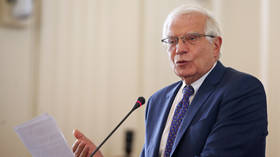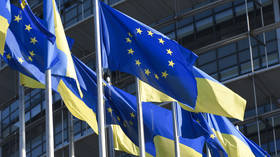EU members told ‘don’t worry about money’ for Ukraine

The EU has enough funds to back member nations that send weapons to Ukraine’s military, the bloc’s foreign policy chief, Josep Borrell said on Monday. His statement comes amid reports that the EU cannot fully reimburse states that are supporting Kiev’s forces.
Speaking prior to a Foreign Affairs Council meeting in Luxembourg, Borrell said “there is enough money, don’t worry about money” before walking away.
Despite the diplomat’s assurances, last week, Politico reported that the European Peace Facility, a €1.5 billion fund meant to assist EU countries in replacing weapons sent to Kiev, was unable to satisfy more than half the requests that it received.
According to the report, this angered Poland, which is one of Ukraine’s main backers in terms of weapons deliveries, with Warsaw presenting a bill for €1.8 billion ($1.75 billion). Poland later backed down, agreeing to 46% compensation, the outlet said.
Meanwhile, the US and Ukraine have both been pressing the EU to do more to support Kiev financially – and in a more expedient manner. Last week, in an apparent reference to Brussels, US Treasury Secretary Janet Yellen urged international donors “to keep stepping up” their aid efforts, stressing that assistance should go in direct cash payments rather than in loans.
Speaking to the Washington Post, one former senior Treasury official noted that “I know they’re very frustrated” about the slow progress of aid, adding that “US officials want to see Europe deliver far more quickly.”
Earlier this month Oleg Ustenko, a top economic adviser to Ukrainian President Vladimir Zelensky called the delays in EU economic aid “unacceptable,” citing the “extreme high pressure” the finance ministry is under.
Last week Zelensky said that his country needs as much as $38 billion to cover next year's estimated budget deficit and another $17 billion to start to restore critical infrastructure. Meanwhile, Washington has committed $8.5 billion in economic aid to Ukraine, with another $4.5 billion slated to arrive by the end of the year.
However, according to the Washington Post’s sources, the EU has pledged €11 billion ($10.7 billion) but has so far only handed over roughly one third of that, which was in the form of loans.













